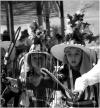Resumen
El siguiente artículo es el resultado de una investigación realizada en los archivos de la Organización de las Naciones Unidaspara la Educación, la Ciencia y la Cultura (unesco), con el fin de determinar el origen del Patrimonio Cultural Inmaterial. Paraello, he abordado la cuestión como un dispositivo de poder transnacional en el sentido foucaultiano del término, basándomeen la bibliografía de una serie de connotados antropólogos franceses. El patrimonio inmaterial constituye un fenómeno culturalcomplejo cuya transformación en una política de alcance global supone la yuxtaposición de intereses locales, nacionales ytransnacionales. Su fallida aparición como parte de la normativa internacional de los derechos de autor ha revelado su incongruenciacon los postulados de la doctrina liberal occidental. Sin embargo, su reciente inauguración como una nueva nociónpatrimonial abre infinitas posibilidades de interpretación en cuanto a su valor y a sus usos políticos múltiples.La revista Apuntes se encuentra registrada bajo la licencia Creative Commons Reconocimiento 4.0 Internacional. Por lo tanto, esta obra se puede reproducir, distribuir y comunicar públicamente en formato digital, siempre que se reconozca el nombre de los autores y a la Pontificia Universidad Javeriana. Se permite citar, adaptar, transformar, autoarchivar, republicar y crear a partir del material, para cualquier finalidad (incluso comercial), siempre que se reconozca adecuadamente la autoría, se proporcione un enlace a la obra original y se indique si se han realizado cambios. La Pontificia Universidad Javeriana no retiene los derechos sobre las obras publicadas y los contenidos son responsabilidad exclusiva de los autores, quienes conservan sus derechos morales, intelectuales, de privacidad y publicidad.
El aval sobre la intervención de la obra (revisión, corrección de estilo, traducción, diagramación) y su posterior divulgación se otorga mediante una licencia de uso y no a través de una cesión de derechos, lo que representa que la revista y la Pontificia Universidad Javeriana se eximen de cualquier responsabilidad que se pueda derivar de una mala práctica ética por parte de los autores. En consecuencia de la protección brindada por la licencia de uso, la revista no se encuentra en la obligación de publicar retractaciones o modificar la información ya publicada, a no ser que la errata surja del proceso de gestión editorial. La publicación de contenidos en esta revista no representa regalías para los contribuyentes.


